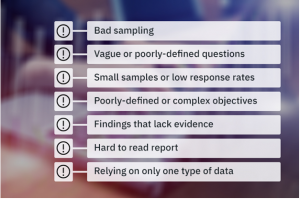7 Major Market Research Mistakes You’re Making Right Now

Introduction
Understanding the market, as well as the behavior of one’s customers and competitors is essential for any business. This holds true for both – a nascent company that’s just begun operations, or a mature organization with years of experience. Business planning and strategy require data and insights on the market you’ll be serving, which is why market research is an important initial step. The reasons why organizations should conduct market research are multitudinous and include identifying new products or services, identifying potential customers, helping understand existing customers, establishing the viability of a product or service, discovering future market trends, keeping your company ahead of competitors, forming your marketing strategy, reducing risks, and identifying threats and opportunities. Although a strong analytical mind, organizational skills, and attention to detail are all that are required to perform market research, sometimes even formally trained market research analysts tend to make mistakes. In this article, we’ll discuss what these mistakes are, along with some software and/or tools you can use to make market research easier for your organization. But first, let us understand what defines market research.
What is market research?

Market research can be defined as the process of evaluating the feasibility of a new product or service, through research conducted on the company’s markets, competitors and customers. It is a way for organizations to study the consumers and gather information about their wants, needs, and beliefs. Market research is at the crux of every successful business. It is generally used to gauge two things: 1) if your target audience actually wants to buy your product or service, and 2) if any other companies are already fulfilling their needs. The purpose of the data you collect through market research is to determine opportunities in the market and capitalize on them. Market research conventionally covers the following:
- Market information
- Market segmentation
- Market trends
- SWOT analysis
- PEST analysis
- Brand health tracking
Market research is not to be confused with market intelligence. You can know more about market research vs market intelligence in our previous blog. Now that we have a general understanding of what market research is, let us move on to the common mistakes that organizations commit while performing it.
7 common market research mistakes that you should be avoiding

1. Bad sampling
It is important to define your sample before you start your research. Be sure to include the “right” people in it, i.e. your target audience. Surveying the wrong people will bring outliers into your research, which can result in a flawed analysis later on. It is okay, however, to divide your sample into sub-groups for a more detailed analysis, or cross-comparison.
2. Vague or poorly-defined questions
You must ask questions that your respondents can answer in a clear, unambiguous manner. If the questions are vague, biased, or too subjective, it’ll be difficult to glean insights and perform a proper analysis. Try to get answers which are neither debatable nor open to interpretation.
3. Small samples or low response rates
This can be a major problem in market research, and the mistake organizations make is to “just go with it”. A small sample size, or low response rate, usually means the same thing towards the end – that you don’t have enough responses to reach a solid conclusion. This in turn means that your whole analysis will be flawed. There are two things to do to stop this from happening: 1) try to get bigger sample sizes of respondents, and 2) ensure a better response rate by giving your respondents a clear call to action, and providing them with an incentive for their time.
4. Poorly-defined or complex objectives
Always start your research with clear objectives, knowing what results you hope to achieve. Poorly-defined or complex objectives will result in confusion and ambiguities in the analysis stage, and your research will fail. Frame your objectives as questions that should be answered once you’ve collected your data and analyzed it.
5. Findings that lack evidence
Each of your findings in your market research report must be backed by evidence. They must also be specific in terms of what a finding means for your organization, who it relates to, and what can be done to improve it. Your findings shouldn’t be vague either, and shouldn’t include terms like ‘some’, ‘a number of’, ‘might’, etc. Also, don’t make hasty generalizations or assumptions based on your findings if you can’t prove them through your data.
6. Hard to read reports
Your market research report should be designed in such a way that people from all functions of your organization can read and understand it. Your report should read like a story and should be linear, with each fact connecting with the one preceding it and the one coming after. Use charts and graphs to offer a visual representation of facts, but don’t stuff the report with them.
7. Relying on only one type of data
In order to get a comprehensive and objective view of your market, it is important that you use multiple sources of information, and carry out both primary and secondary research. While you can decide both on research methodologies yourself, you can use a market intelligence software to gather secondary data on the market.
Conclusion
The goal of market research is to capture your target market’s demographics, needs, wants, and frustrations. It removes the guesswork from your business decisions. While it is advisable to conduct primary research using focus groups and surveys, a market intelligence software can help you a lot when gathering data on the market and your competitors. Its benefits aren’t limited to that, regular insights into the market and competition will help you take business decisions with confidence. Remember that market research answers a lot of important questions which are essential for an organization to make their product or service a success in the market. Avoiding the mistakes mentioned above will help you answer those questions clearly, and provide a competitive advantage in your business endeavors. Use any and all resources you can to ensure that your market research is as detailed and comprehensive as possible.





